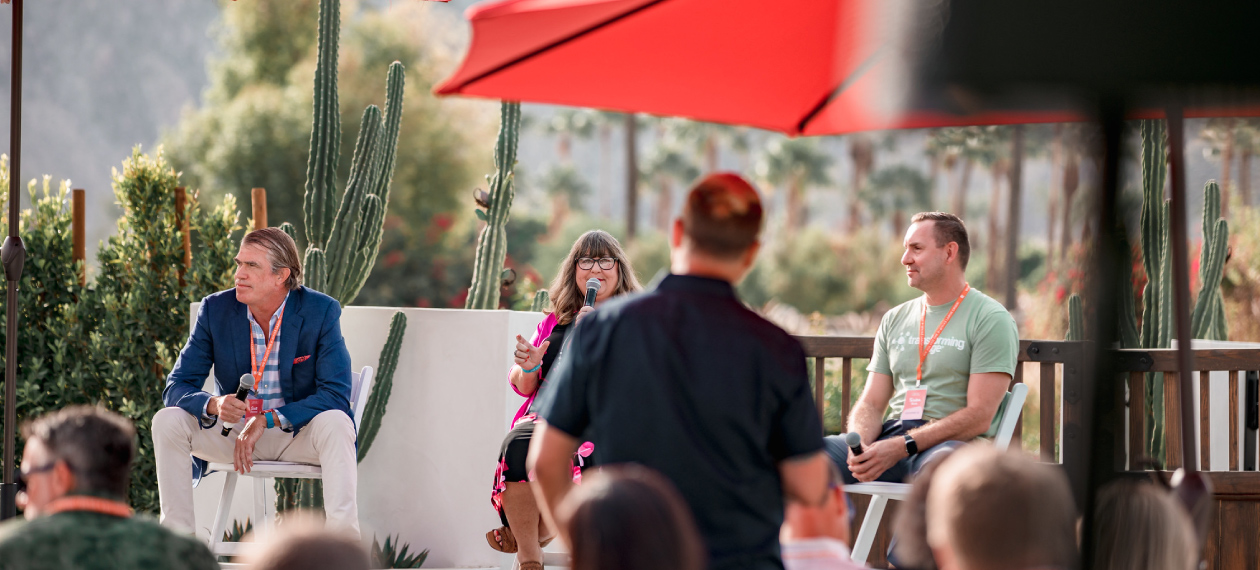In his talk at the Senior Living Innovation Forum last month, Nexus Insights founder Bob Kramer argued that the industry isn’t being bold enough. In an era that calls for transformative changes, he said, operators have instead chosen incrementalism—piecemeal approaches that can’t possibly solve the structural problems at hand.
Kramer’s remarks provided fruitful material for the panel following him: “Where Do We Go From Here?,” with panelists Torsten Hirche, CEO of nonprofit provider Transforming Age; Anja Rogers, CEO of for-profit provider Senior Star; and Scott Stewart, Founder and Managing Partner of the investment firm Capitol Seniors Housing.
“It’s A Great Industry”
While Hirche and Rogers both agreed with Kramer, Stewart offered a firm counterpoint: “I think we’re absolutely being bold enough.” He tracked the industry’s rapid evolution since its relatively recent birth 40-odd years ago, from “mom living in the back room” to the “idyllic country club communities” of the active living era. “It’s a great industry,” he said. “Folks are living longer, happier, healthier lives because they have better nutrition, they’ve got preventative healthcare, they've got stimulating activities, they’re making friends, they’re safe. And through that, dignity has been restored.”
Acknowledging room for improvements “on the margins” in memory care, Stewart pushed back on calls for wholesale transformation. “Keep a better eye on your airflow systems and a few other things,” he suggested. More urgent to him is the “silver tsunami” barreling towards the active living industry. “By the year 2035, there’ll be more seniors out there than folks who are 18 and younger,” he said. “That presents a tremendous opportunity that I think the markets are capturing with active living.”
Kramer vs. Stewart: “Selling Community Is Not Enough”
When Stewart predicted a bright future for active living communities designed around their residents’ social lives, none other than Bob Kramer spoke up from the audience to disagree. “I think what Scott’s talking about is basic incrementalism around the edges, and not fundamental change,” he chimed in, arguing that communal experiences won’t be enough to attract customers in an increasingly on-demand world where seniors can stay home longer and get the amenities they need. “Just selling community is not enough to rethink what we provide in senior living,” he posed. “Ultimately, it's connecting with what gives that individual person that reason to get up the next morning.”
“Incrementalism is one way to describe it, but the real answer is people want to be with other people,” Stewart responded, stressing that while he loves Kramer’s idea for communities of change-makers, he thinks it’s a niche market.
This Revolution Will Be Personalized
Perhaps Stewart and Kramer were both right. “We’re moving more and more towards personalization,” Hirche observed. “It’s going to be individualized solutions toward whatever that person wants—millions of them, billions of them. So there’s gonna be a person that likes and appreciates the incremental change… and there’s going to be the person that totally hates that.”
For all the industry’s strengths at getting to know its customers on the ground, Hirche argued, it still struggles to understand them at scale. “The CNA may know that customer, the dishwasher may know the resident that's walking down the hall and they have a morning conversation,” he said. “I don’t. You don't. So how do we scale that up? How do we get to know people, to develop new, better solutions while the other ones still apply?”
This poses an important question for operators, designers, and investors alike. “What we have to figure out is what products and services are we not providing? What canvas are we not providing for people to paint their life journey?”
Solving the Labor Crisis
The panelists went on to discuss the multi-pronged approaches they’re bringing to the labor crisis. For Transforming Age, one key strategy is the development of affordable workforce housing to bring workers closer to their communities. Senior Star, meanwhile, is reducing turnover by bringing its minimum wage up to $15/hour, with additional premiums tied to the type of work—memory care, weekend shifts, tenure pay for longtime employees. Rogers compared it to a cafeteria plan, empowering workers to design their own schedules and roles.
From the audience, Charles Turner, CEO of Kare, a labor platform connecting communities with talent on a shift-by-shift basis, argued that wages are only one part of the equation; it’s equally important for operators to nurture a culture where management respects employees and trains great leaders. Stewart’s experience as an investor suggests that it might take some restructuring to find the right calculus: he described an Atlanta-based operator that recently created its own human resources department to tackle the labor crisis head-on. “They used to rely on headhunters,” he said, but “that’s not getting it done.”
Humans Serving Humans
Bringing senior living into the future will require massive digital transformation—without losing that crucial human touch. At Transforming Age, Hirche is focused on ramping up business intelligence and data analytics efforts to gain a more precise understanding of customers and employees alike. He’s also looking at automation— “the labor crisis is not going to go away,” he cautioned —and an online marketplace to “open up a dialogue” between operators and customers. (Stewart, on the other hand, believes the labor crisis is on its way out the door; in his eye, the long-term challenge will be inflation.)
Rogers agreed that the industry needs to be bolder in its adoption of new technology, especially if (as Hirche predicts) new players like Apple and Amazon muscle their way into the space — leveraging powerful data capabilities to carve up the market. This makes it even more important for operators to forge personal, lasting relationships with their customers by scaling up their own technology and data operations. “That growth mindset is going to be critically important,” she said.
At the same time, she stressed the importance of flexibility and humility. After all, new technology is perpetually giving way to newer technology, and operators need to be willing to accept change. She also argued that the pursuit of bold changes should not distract from the importance of small changes, or minimally viable moves. “Sometimes in our industry, we have to be willing to make little moves and be happy and celebrate what we've accomplished, but not settle, and continue to push ourselves,” Rogers concluded. “Technology’s a really big piece of this, but it's also trying to understand that human element. We are humans serving humans, and that is never going to go away.”

Posted by
SLIF heads to Carlsbad!
The One of a Kind Retreat for Senior Housing Leaders.
May 31 - June 2, 2026 | Carlsbad, CA
Learn More









Comments